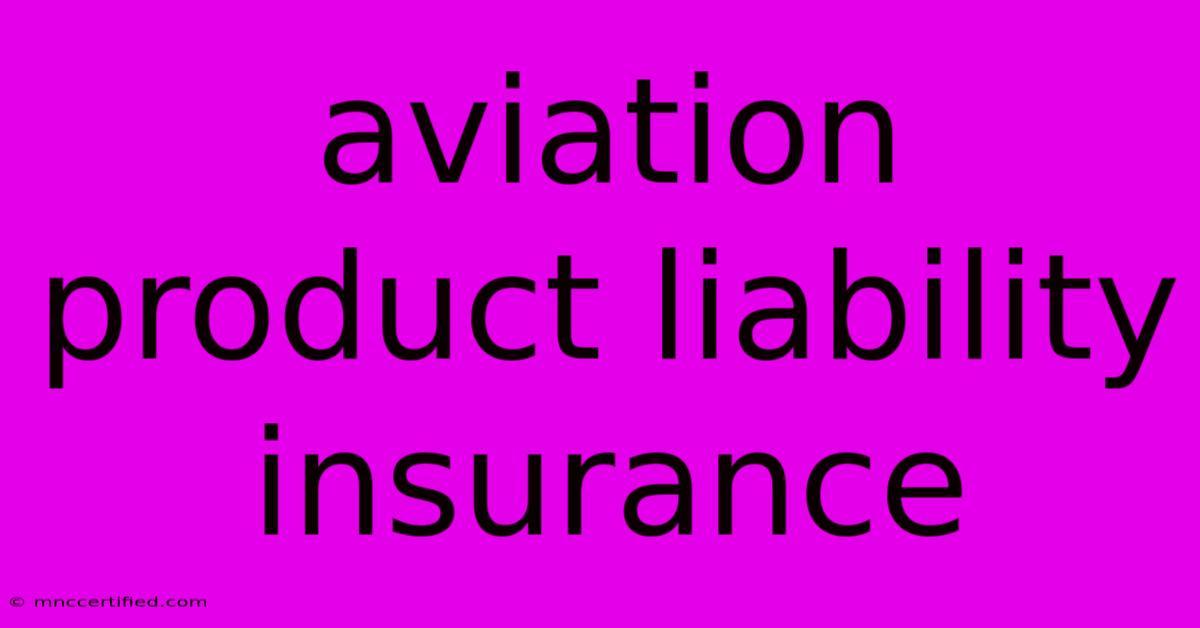Aviation Product Liability Insurance

Table of Contents
Aviation Product Liability Insurance: Protecting Your Business in the Skies
The aviation industry is a complex and high-risk environment. Manufacturers, distributors, and even repair shops can be held liable for defects in their products that lead to accidents, injuries, or property damage. This is where aviation product liability insurance comes in, providing vital financial protection against these potential risks.
What is Aviation Product Liability Insurance?
Aviation product liability insurance is a specialized form of liability insurance that protects businesses involved in the production, distribution, or maintenance of aircraft parts and components. It covers the financial consequences of legal claims arising from defective products that cause:
- Aircraft accidents: This could include crashes, engine failures, or other malfunctions caused by defective parts.
- Personal injury: This covers injuries to passengers, crew members, or third parties on the ground as a result of a defective product.
- Property damage: This includes damage to aircraft, airports, or other property caused by a defective part.
- Legal defense costs: The policy covers legal fees and expenses incurred in defending against product liability lawsuits.
Why is Aviation Product Liability Insurance Important?
The aviation industry is subject to strict regulations and high safety standards. Even a small defect in a component can have catastrophic consequences. Without adequate product liability insurance, businesses face significant financial exposure if they are sued for product defects:
- High settlement costs: Product liability lawsuits can involve massive payouts for damages, injuries, and legal fees.
- Business disruption: Legal proceedings can be time-consuming and resource-intensive, impacting operations and profitability.
- Reputation damage: A product liability claim can severely damage a company's reputation, leading to decreased sales and customer trust.
Key Features of Aviation Product Liability Insurance:
- Coverage limits: The policy sets a maximum limit on the amount of coverage available for each claim.
- Deductibles: A deductible is the amount the insured pays upfront before the insurance company covers the rest of the claim.
- Exclusions: Policies typically exclude certain types of claims, such as intentional acts or claims arising from pre-existing conditions.
- Defense costs: The policy usually covers legal defense costs, including attorney fees, expert witness fees, and court costs.
Obtaining Aviation Product Liability Insurance:
- Consult with an insurance broker: An experienced aviation insurance broker can help you identify the right insurance coverage for your business and negotiate the best rates.
- Provide detailed information: You will need to provide detailed information about your business, the products you manufacture or distribute, and your past claims history.
- Compare quotes: Get quotes from multiple insurance providers to find the best coverage at the most competitive rates.
Tips for Minimizing Product Liability Risk:
- Implement robust quality control procedures: Ensure rigorous testing and inspection of all components to identify defects.
- Maintain thorough documentation: Keep accurate records of product design, production, and testing to demonstrate due diligence.
- Provide clear warnings and instructions: Clearly communicate potential hazards and provide comprehensive instructions for safe use and maintenance.
- Stay informed about industry regulations: Stay current on all applicable aviation regulations and safety standards.
- Offer comprehensive training: Provide proper training to employees on product safety, quality control, and regulatory compliance.
Conclusion:
Aviation product liability insurance is an essential safeguard for businesses involved in the aviation industry. It provides financial protection against the potentially devastating consequences of product defects. By understanding the importance of this coverage, carefully selecting an insurance policy, and implementing proactive risk management strategies, you can mitigate your exposure and protect your business's future in the skies.

Thank you for visiting our website wich cover about Aviation Product Liability Insurance. We hope the information provided has been useful to you. Feel free to contact us if you have any questions or need further assistance. See you next time and dont miss to bookmark.
Featured Posts
-
Week 10 Locker Room Falcons Vs Saints Breakdown
Nov 11, 2024
-
Best Insurance Panels For Therapists
Nov 11, 2024
-
Does Insurance Cover Key Replacement
Nov 11, 2024
-
Haalands Transfer Plan B Emerges For City
Nov 11, 2024
-
Falcons Vs Saints Week 10 Locker Room Talk
Nov 11, 2024